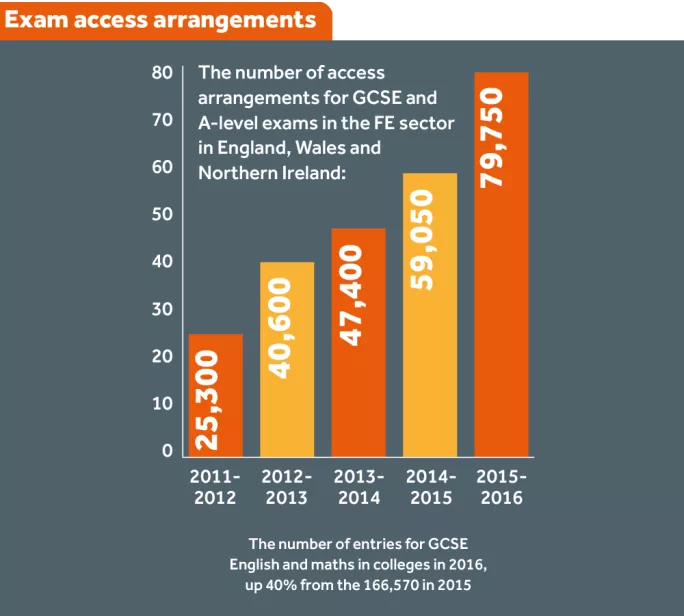The vulnerable victims of exam bureaucracy

For most young people, the prospect of being tested under timed conditions in an exam is a cause of anxiety.
Those who fail their English and maths GCSEs at school face even greater pressure, as they are forced to take them again when they reach college under the government’s controversial GCSE resits policy. Yet the situation is even worse for tens of thousands of FE students already coping with special educational needs and disabilities who are facing GCSE resits.
Because these students have yet another barrier to contend with once they leave school and enter further education: the help they get in their GCSE exams at school to ensure they are not disadvantaged because of their particular needs is not automatically transferred.
In what college leaders condemn as a needless bureaucratic burden, these students have to repeat the process of applying for access arrangements. These arrangements, granted by the Joint Council for Qualifications (JCQ), allow students help such as more time to do exams, scribes to write down answers or people to read out questions.
But the arrangements only last for 26 months and are not simply transferred over when students leave school for another education establishment, in a situation prompting college leaders to demand a change in the rules.
Bill Watkin, chief executive of the Sixth Form Colleges Association, says: “Additional support is made available to those who require it in their exams at 16. But if they then go to a college and take a resit in maths or English three months later, they have to be re-assessed to secure the same additional support the second time around.
“This is costly and time-consuming. And, to make matters worse, it has to be done very quickly because arrangements must be in place for the first examinations in November.”
This situation has arisen because the original arrangement was made between the school and the exam board and is deemed non-transferable to the college, according to Watkin.
“This seems absurd,” he says. “If a young person with a chronic diagnosis needs help in June, it is safe to say he or she still needs it in November, even the following June. Surely we can address this bureaucratic barrier and remove the requirement to re-assess students’ needs for special arrangements in exams.”
‘Illogical burden’
The current situation is “an illogical administrative burden,” according to Jerry White, deputy principal at City College Norwich. “We have three full-time members of staff working non-stop year round just on this - that equates to them doing around 550 of these assessments a year”, he says.
Being forced to repeat the whole process of getting access arrangements again “is quite a difficult thing for a young person to go through”. White adds: “I think sometimes we lose sight of the impact on the young people and parents who often feel very frustrated.”
He predicts that the problem will be exacerbated by the GCSE resits policy and the reform of vocational qualifications, “making the situation considerably more difficult for colleges, students and staff”.
Neither the Department for Education nor Ofqual has data on the number of access arrangements for FE students doing GCSE resits, but the latest government data for the FE sector shows that 21 per cent of students taking GCSE and A levels in 2015-16 had access arrangements.
The 2010 Equality Act and the GCSE resit policy have resulted in a steep rise in the number of access arrangements granted for FE students. Almost 80,000 access arrangements were granted across the FE sector in 2015-16 - up from around 25,000 in 2011-12.
Rebecca Bromley-Woods, assistant principal for supported learning at The Manchester College, says the status quo makes the transition from school to FE “much more precarious than it ought to be”. She says that trying to get access arrangements for FE students “is a race to the finish, where some learners are sadly, and inevitably, disadvantaged”.
Colleges often need to reassess students, according to Catherine Sezen, senior policy manager at the Association of Colleges. This is something that “wastes both precious funding and time, as well as being stressful for the young people”, she says. “AoC would like to see a simple electronic system for the transfer of such information, whereby students agree for their data to be shared with colleges.”
A spokesperson for JCQ says: “JCQ is currently reviewing the access arrangements for candidates undertaking GCSE resits in FE colleges and will make an announcement in due course”.
The decision was prompted by discussions held with college leaders and other representatives last week. JCQ agreed to focus on how colleges apply for access arrangements for students who had these in place at their previous school.
An Ofqual spokesperson says: “We agree the arrangements for applying for a reasonable adjustment should not be unduly burdensome. We will continue to talk to the International Exam Officers’ Association, JCQ and others about the issues that have been raised.”

You need a Tes subscription to read this article
Subscribe now to read this article and get other subscriber-only content:
- Unlimited access to all Tes magazine content
- Exclusive subscriber-only stories
- Award-winning email newsletters
Already a subscriber? Log in
You need a subscription to read this article
Subscribe now to read this article and get other subscriber-only content, including:
- Unlimited access to all Tes magazine content
- Exclusive subscriber-only stories
- Award-winning email newsletters